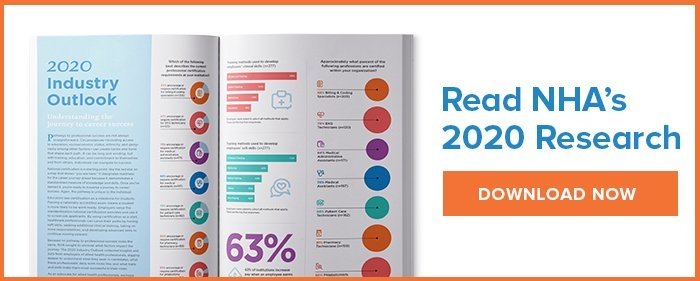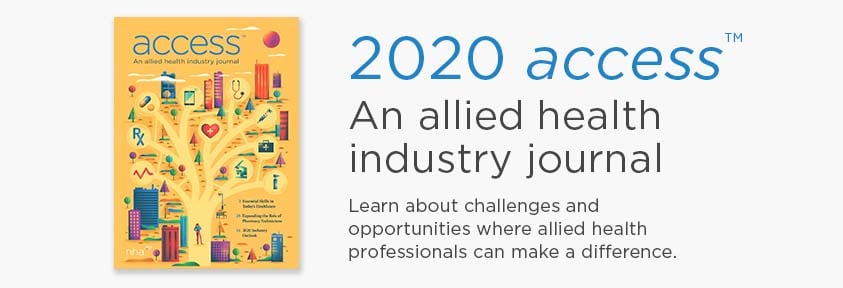Join the team from National Healthcareer Association to dig into the latest research and trends impacting the allied health industry. The 2020 Industry Outlook collected insights and data from employers of allied health professionals, digging deeper to understand what they seek in candidates, what these professionals’ daily work looks like, and what traits and skills make them most successful in their roles.
The 2020 Industry Outlook research is available to download. Click below to get your copy.
Read the Full Transcript:
Introduction: Welcome to access on air from NHA. This podcast is dedicated to providing educators and employers of frontline healthcare workers with expert perspective on trends impacting and elevating the industry. These discussions can help you achieve your goals as you continue to pave pathways toward professional success for those working in allied health. Thanks for listening.
Jessica Langley-Loep: Welcome. This is Jessica Langley. I'm the executive director of education and advocacy for NHA. And I'm excited today to bring you some look into NHS 2020 industry outlook. What we have done is hopefully brought together a ton of research and data and insights for you all to help grow your career pathways. So this, this data we know that no career pathway is the same for one person. And so by going out and polling people and bringing this data to you, we are able to collect insights and data from industry experts and employers across different allied health professions that help us dig deeper into understanding why candidates seek out certification, why candidates seek out specific professions, what their, their daily work life looks like within these professions and what traits and skills make them most successful in their roles. And I have a couple of individuals with me today that are gonna help me discuss some of these great stats and trends with you first. I'd like Connie Sears to introduce herself. And she's going to tell us a little bit about what we've seen about certification trends.
Connie Sears: Hello, everyone, Connie Sears. I'm on the NHA advocacy team with Jessica Langley. And what we're seeing is that national certification is being seen as a standard of knowledge and scales. And it's a starting point for someone on their career path where an individual can then grow with additional clinical training, increased responsibilities, and they can develop advanced skills, which would all be opportunities to then move up the career ladder in their profession. We're seeing that certification for the professions that we serve certification is strongly encouraged or required anywhere from 73% to 93% of the time with certification being required overall 75% which is great to see.
Jessica Langley-Loep: And Connie, you have the opportunity in your daily kind of a workflow to talk with employers on a day to day basis about what they're wanting from applicants and what their organizations hiring policies and procedures are, what examples or trends can you give us about those conversations that you're having with them regarding certification?
Connie Sears: Yes, typically they leave the applicants. There's three buckets. There's typically a training requirement and experience requirements. And most often we're seeing a certification requirement as well, or at least it's a place on my application that, that they're looking to check that box.
Jessica Langley-Loep: Great. And then we also know that most often, or we know applicants also have questions around, well, if I get this certification, is it going to increase my salary within my specific role or profession Connie did, did we get any stats on that this year in our industry outlook research?
Connie Sears: Yes. It's looking like at least 63% of the employers are noting an increase in pay upon certification.
Jessica Langley-Loep: Awesome. Something else I know that they think about is their salary. And so I know part of the research that we did came from BLS and looking at kind of salary ranges across the professions that we serve. What trends are we seeing there?
Connie Sears: Yes, we're seeing trends with an increase in pay for those that are able to career ladder to develop those additional skills such as professionalism, critical thinking, verbal communication those all help with an increase in pay and, and help people to climb their career ladders as well within their professions.
Jessica Langley-Loep: Great. And we've also seen that when individuals stack certifications, not only does that help with their career ladder goals, but a lot of the times adds a pay to that as well. I'd also like to introduce Jeremy Sasser and have him tell you a little bit about himself and he's going to dig a bit into something that Connie mentioned as one of the main attributes that employers are looking for today in applicants. Okay.
Jeremy Sasser: Ah, thank you so much, Jessica, for having me. My name is Jeremy Sasser. I'm the content strategist for pharmacy technician profession here at NHA. And Jessica you're absolutely right. Soft skills we know is of great importance and all of these allied health care roles. And so part of the survey that we had employers complete for this research this year, we wanted to identify two first, what are the most important, soft skills that their employees can have to make them successful in their roles? And the second is then what soft skills do they feel are most lacking and going across all of the professions? I would say it's, it's not a huge surprise that critical thinking is often touted as one of the most important soft skills, but also one of the most often lacking in, in employees. So there's a lot of information out there on soft skills.
Jeremy Sasser: One misnomer is that whatever soft skills somebody has coming into a role, those are the soft skills they have and that's it. But we know that we can objective measure someone's level of understanding of soft skills. It's not just subjective in nature. And we also know that with appropriate training, those areas pertaining to soft skills, you know, such as professionalism, self-awareness verbal communication, critical thinking, all of those things can be improved with the right tools and the right training. And of course on the job experience will help to a certain extent there. But certainly right now, the extraordinary times we find ourselves living in we've had to make a fairly quick transition across multiple healthcare professions into tele-health, right? Whether that's telepharmacy, whether that's seeing patients via computer consultations. And so any kind of pre-work that's happening there by these allied health professionals, it's even more critical, even more important that they have those critical thinking skills, the ability to work more or less autonomously and solve problems and remain professional and, and remain able to care for the patients that they are seeing via these telehealth visits.
Jessica Langley-Loep: Jeremy, that's a great point. We know soft skills, professionalism, essential skills, and other names that people most commonly refer to them really helped create that foundational base and kind of you know, for individuals and to how they work and how they interact with, with other people and especially their patients. Once people have that foundation, we are now seeing that because the healthcare industry is moving towards a patient centered care, more team based care model that entry-level allied health professions are actually starting to gain some additional roles, responsibilities, and duties. Can you share a little bit about what the research told us from a couple of our professions about some of the advanced skills that they're getting allowed to do now that they maybe didn't get to a or two ago?
Jeremy Sasser: Yeah. And you know, again, my main area of knowledges is pharmacy technician. So I'll just, I'll start there. We've seen a explosive increase in the need, the identified need for pharmacy technicians to do more than what traditionally they have been doing. You know, the line there of course is that clinical judgment lines. So where a question or a task comes into play and I'm, and I'm sure this applies to our other professions as well. When it's requiring the clinical judgment or clinical decision making or counseling of patients, consultations of patients you know, those are more of the advanced professional types of duties that allied health care workers aren't doing, but all of the things that are going on behind the scenes, for instance, in pharmacy technician, product verification, maybe they're taking new prescriptions verbally over the phone, transferring prescriptions.
Jeremy Sasser: You know, we're seeing states now that are allowing technicians to immunize point of care testing is on the horizon. You know, they have to be able to help a pharmacist complete all of those tasks. It's just not possible for one, one person alone. And I'm sure that this COVID-19 pandemic, it'll be interesting to see what our outlook looks like next year, because I'm sure that everybody everybody's role in all parts of healthcare are going to change in some manner, right. Billing and coding is becoming more and more applicable, not just to the medical field as well, but in, in pharmacy, you know, they're starting to be more and more claims that need to be built on the medical side. So pharmacy technicians are, are needing to now think about getting some additional skills or training in, in medical billing and coding in some circumstances, you know, phlebotomy technicians.
Jeremy Sasser: I'm sure it'll be interesting to see how that might change in response to, to what's been, been going on. But yeah, across the board, we're realizing that with the strain on the healthcare system, these allied health professionals really need to be doing more and they can do more. They have the knowledge base, it may take a little bit of upskilling or additional training, but they can really do a lot more to kind of help with the workflow of all of these patients and making sure they're receiving the highest level of care.
Jessica Langley-Loep: You got it. It really goes back to the philosophy of each of our professions working to the top of their credential and license that, you know, is this same can be said for physicians and nurses. So some of those duties and responsibilities that they were doing previously are now being pushed down to, you know, medical assistants and others like that. They're doing more scribing, they're doing more phone screenings and triages, you know bringing assistance to making that real, that workflow really more effective. So we hope that today, you guys have seen a couple of emerging trends within our allied health professions. One being that the desire and the importance of certification continues to rise each year as we do these research studies, more and more employers are recognizing not only the value of certification by validating an individual's skills and knowledge and competency but making it a requirement for employment or soon thereafter, we're seeing job duties and responsibilities grow across the professions we serve.
Jessica Langley-Loep: We're seeing that individuals are looking to take on more duties and responsibilities and add to their career readiness and their career path opportunities with certification kind of being the baseline or the starting foundation for that. And most importantly, to have that well rounded individual, we know that soft skills, professionalism, critical thinking, communication. All of those are still a very important aspect of an individual working within the career field. And there's a high need and demand for individuals to be trained and skilled in those particular areas. So we hope that you've enjoyed this kind of overview of our research. The 2020 industry outlook you know, is, is given to you all from NHA as we're an advocate for allied health professions. We hope you can use this data to help your students and employees or learners navigate their own path and achieve their career dreams. And anyone can access all of the research and dig into this information even further, by going to NHA now.com/access-twenty 20, that's NHA now.com/access-twenty 20. And it will take you to our access homepage where you not only can find all of the 2020 industry outlook data, but also our editorial articles that you hopefully will enjoy reading as well. So thanks so much. And, and I have to say too,
Jeremy Sasser: That the access™ publication this year is I highly recommend it. It's put together great, a lot of great information beyond just this outlook. The marketing team here at NHA really outdid themselves this year when they put all of this together. So a fantastic job, and it's something you definitely want to get your hands on. We hope you enjoy it.

.png?width=2500&height=1007&name=2020%20Trends%20(1).png)



